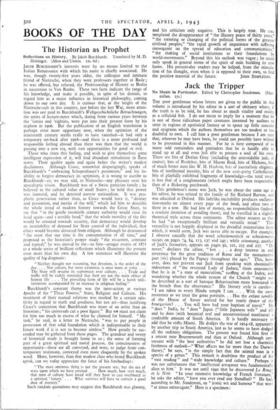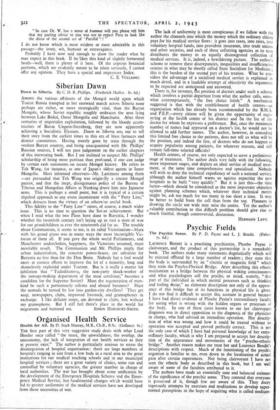Jack the Tripper
THE poor gentleman whose letters are given to the public in this volume is introduced by his editor in a sort of obituary where, if the truth is to be told, he has about as much vitality and reality as a celluloid fish. I do not mean to imply for a moment that he is one of those ridiculous paper creatures invented by authors to strut in regions of egotistical fantasy or to spout up little conceits and epigrams which the authors themselves are too modest or too doubtful to own. I call him a poor gentleman because I am sure that, whoever he may have been, he could not possibly have wished to be presented in this manner. For he is here composed of so many odd remainders and reminders that he is hardly able to stand up at all and even less able to possess a soul of his own. There are bits of Dorian Gray (including the unavoidable jade, of course), bits of Baedeker, bits of Mayne Reid, bits of Hichens, bits of much better men like W. H. Hudson, bits of journalistic elegance, bits of intellectual jocosity, bits of the new easy-going Catholicism, bits of playfully exhibited fragments of knowledge—the total result is less that of a conglomerate (which might have been respectable' than of a flickering patchwork.
This gentleman's name was Jack, he was about the same age a, his editor, he was related to the family of Sir Richard Burton, and was educated at Oxford. His ladylike excitability produces exclama- tion-marks on almost every page of the book, and often two or three in a row. He had lots of money, no responsibilities (indeed, a resolute intention of avoiding them), and he travelled in a slightly theatrical style across three continents. The editor assures us that he had " an exceptionally brilliant and versatile mind.". This versatility is not happily displayed in the dreadful mannerisms from which, it would seem, Jack was never able to escape. For example, I observe causally that the word schwiarmerisch or schwiirmere: occurs on pages 74, 84, 113, 137 and 245 ; while stimmung, another of Jack's favourites, appears on pages 92, tor, 225 and 227. " He never," declares the editor, " lost . . . a deep interest in and reverence for the great tradition of Rome and the monumental part (sic) played by the Papacy throughout the ages." This, how- ever, does not prevent our Jack from speaking with abominable indecorum of " the reverend Lady of Judaea," -from announcing that he is in " a state of materialism," scoffing at the Index, and wondering whether the whole system of the Church " might not be described as a sort of baroque Behaviourism more honoured in the breach than the observance." His literary style is careless: " I am taken to every Hindu temple I can. . . . With the same reverence as we treat the great portraits. . . Has the enfant terrible of .the House of Savoy arrived for her yearly epater of the bourgeoisie? . . . You will have had your baptism of travel." He " does " India, he " does " Japan (" little Japanese wife" and all) and he does (with botanical zeal and unconventional manliness) 3 creditable amount of South America. It is hardly necessary to add that he visits Miami. He dodges the war of 5914-a, apparently by another trip to South America, just as he seems to have dodged all the ordinary obligations. The present war found him first in a retreat near Bournemouth and then at Oxford. Although con- versant with " the best authorities " he did not lose a charming freshness of outlook—" What affects me far more than the Darwin theory," he says, " is the simple fact that the animal man is a species of a genus." This remark is doubtless the product of his " vast reading " and " wide knowledge and culture." Perhaps it was not unfortunate that " intellectual arrogance was fundamentally alien to him." It was not until 194o that he discovered Le Rouge et le Noir. "In your extensive knowledge of French literature," he asks the editor, " have you ever read any Stendhal? " He had, according to Mr. Sandeman, an " ironic wit and humour " that were " at times extravagant." Here is a specimen: " In case Dr. W. has a sense of humour will you please tell him that my parting advice to you was not to expect Peru to look lilte the decor of the second act of Parsifal '! ! "
I do not know which is most evident or most admirable in this passage—the irony, wit, humour or extravagance.
Probably I have now said enough to show the reader what he may expect in this book. If he 'likes this kind of slightly fermented broth—well, there is plenty of it here. Of the copious botanical portions, which are evidently meant to be taken seriously, I cannot offer any opinion. They have a special and impressive Index.
C. E. Vuulamy.



























 Previous page
Previous page